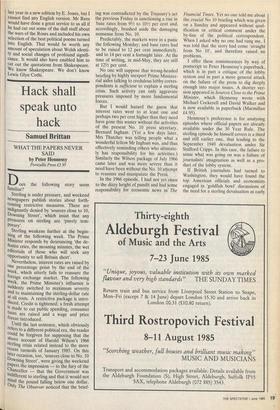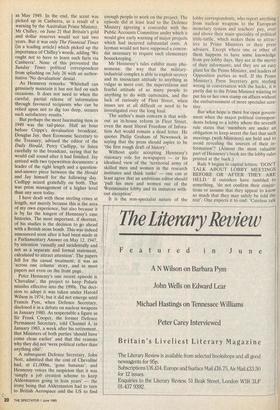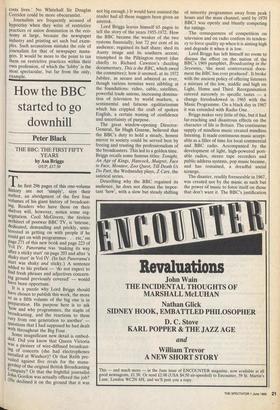Hack shall speak unto hack
Samuel Brittan
WHAT THE PAPERS NEVER SAID by Peter Hennessy
Portcullis. Press £3.95
Does the following story seem familiar?
Sterling is under pressure, and weekend newspapers publish stories about forth- coming restrictive measures. These are Indignantly denied by 'sources close to 10, Downing Street', which insist that any pressures on sterling are 'purely tem- porary'.
Sterling weakens further at the begin- ning of the following week. The Prime Minister responds by denouncing 'the de- featist cries, the moaning minnies, the wet editorials of those who will seek any opportunity to sell Britain short'.
Nevertheless, interest rates are raised by one percentage point by the end of the Week, which utterly fails to reassure the foreign exchange market. The following week, the Prime Minister's influence is suddenly switched to maximum severity and to maintaining the sterling-dollar rate at all costs. A restrictive package is intro- duced. Credit is tightened; a fresh attempt is made to cut public spending, consumer taxes are raised and a wage and price freeze -introduced.
Until the last sentence, which obviously refers to a different political era, the reader Could be forgiven for supposing that the above account of Harold Wilson's 1966 sterling crisis related instead to the more recent turmoils of January 1985. On this later occasion, too, 'sources close to No. 10 Downing Street', were giving the weekend Papers the impression — to the fury of the Chancellor — that the Government was Indifferent to sterling and that it would not Mind the pound falling below one dollar. Doly The Observer noticed that the brief- ing was contradicted by the Treasury's act the previous Friday in sanctioning a rise in base rates from 91/2 to 101/2 per cent and, accordingly, brushed aside the damaging nonsense from No. 10.
Predictably, the markets were in a panic the following Monday; and base rates had to be raised to 12 per cent immediately, and to 14 per cent a fortnight later. At the time of writing, in mid-May, they are still at 121/2 per cent.
No one will suppose that wrong-headed briefing by highly inexpert Prime Minister- rial aides talking to credulous lobby corres- pondents is sufficient to explain a sterling crisis. Such activity can only aggravate pressures imposed by more fundamental forces.
But I would hazard the guess that interest rates went to at least one and perhaps two per cent higher than they need have gone this winter without the activities of the present No. 10 press secretary, Bernard Ingham. (Yet a few days later, Mrs Thatcher was telling people what a wonderful fellow Mr Ingham was, and thus effectively reminding others who ultimate- ly has responsibility for his activities.) Similarly the Wilson package of July 1966 came later and was more severe than it need have been without the No. 10 attempt to reassure and manipulate the Press.
In the 1966 episode, I had not yet risen to the dizzy height of pundit and had some responsibility for economic news in The Financial Times. Yet no one told me about the crucial No 10 briefing which was given on a Sunday and appeared without qual- ification or critical comment under the by-line of the political correspondent. When I asked why no one had rung me, I was told that the story had come 'straight from No 10', and therefore raised no problems.
I offer these reminiscences by way of postscript to Peter Hennessy's paperback, which is in part a critique of the lobby system and in part a more general attack on the failure of the press to dig deeply enough into major issues. A shorter ver- sion appeared in Sources Close to the Prime Minister, which Hennessy wrote with Michael Cockerel! and David Walker and is now available in paperback (Macmillan £4.95).
Hennessy's preference is for analysing episodes where official papers are already available under the 30 Year Rule. The sterling episode he himself covers is a third and still earlier one, that leading to the September 1949 devaluation under Sir Stafford Cripps. In this case, the failure to sense what was going on was a failure of journalists' imagination as well as a pro- duct of the lobby system.
If British journalists had turned to Washington, they would have found the top American officials and economists engaged in 'goldfish bowl' discussions of the need for a sterling devaluation as early
as May 1949. In the end, the scent was picked up in Canberra, as a result of a warning by the Australian Prime Minister, Mr Chifley, on June 21 that Britain's gold and dollar reserves would not last two years. But it was only The Financial Times (in a leading article) which picked up the importance of Chifley's words, adding 'We ought not to have to learn such facts via Canberra'. None of this prevented the Sunday Times political correspondent from splashing on July 26 with an author- itative 'No devaluation' denial.
As Hennessy remarks: 'Whitehall can genuinely maintain it has not lied on such occasions. It does not need to when the careful, partial release of information through favoured recipients who can be relied upon not to dig too deep, secures such satisfactory results.'
But perhaps the most fascinating item in 1949 was the tail-piece. Half an hour before Cripps's devaluation broadcast, Douglas Jay, then Economic Secretary to the Treasury, advised the editor of the Daily Herald, Percy Cudlipp, to listen carefully to the broadcast, saying that he would call round after it had finished. Jay arrived with two typewritten documents: a leader of the right length and a question- and-answer piece between the the Herald and Jay himself for the following day. Cudlipp seized gratefully on both. That was press management of a higher level than any seen today.
I have dealt with these sterling crises at length, not merely because this is the area of my own experience, but also because it is by far the longest of Hennessy's case histories. The most important, if shortest, of his studies is the decision to go ahead with a British atom bomb. This was indeed announced soon after it had been made in a Parliamentary Answer on May 12, 1947, by intention 'casually and incidentally and not as a separate and formal statement, calculated to attract attention'. The papers fell for the casual treatment; it was an `across one column' story, and in most papers not even on the front page.
Peter Hennessy's one recent episode is `Chevaline', the project to keep Polaris missiles effective into the 1990s. The deci- sion to adopt it was taken under Harold Wilson in 1974; but it did not emerge until Francis Pym, when Defence Secretary, disclosed it in a debate on nuclear weapons in January 1980. As respectable a figure as Sir Frank Cooper, the former Defence Permanent Secretary, told Channel 4, in January 1983, a week after his retirement, ; that Ministers of both parties 'should have come clean earlier' and that the reasons why they did not 'were political rather than anything else'.
A subsequent Defence Secretary, John Nott, admitted that the cost of Chevaline had, at £1,000m, 'gone bananas'; and Hennessy voices the suspicion that it was `simply a job creation scheme to keep Aldermaston going in lean years' — the irony being that Aldermaston had to turn to British Aerospace and the US to find
20 THE SPECTATOR 1 June 1985
enough people to work on the project. The episode did at least lead to the Defence Ministry agreeing a concordat with the • Public Accounts Committee under which it would give early warning of major projects which had incurred substantial costs. A layman would not have supposed a concor- dat necessary to require such elementary housekeeping.
Mr Hennessy's tales exhibit many phe- nomena: the way that the military- industrial complex is able to exploit secrecy and its insouciant attitude to anything as vulgar as mere cost; the superstitious and fearful attitude of so many people to anything to do with currencies, and the• lack of curiosity of Fleet Street, when issues are at all difficult or need to be investigated over the long haul.
The author's main concern is that with- out an in-house reform in Fleet Street, even the most liberal Freedom of Infora- tion Act would remain a dead letter. He quotes Philip Graham of Newsweek in saying that the press should aspire to be `the first rough draft of history'.
Without quite accepting Hennessy's visionary role for newspapers — or his idealised view of the 'territorial army of skilled men and women in the research institutes and think tanks' — one can at least agree that an ambitious editor should `pull his men and women out of the Westminster lobby and its imitators with- out exception'.
It is the non-specialist nature of the lobby correspondents, who report anything from nuclear weapons to the European monetary system and teachers' pay, over and above their main speciality of political tittle-tattle, which makes them so attrac- tive to Prime Ministers or their press advisers. Except where one or other of them happens to have some knowledge from pre-lobby days, they are at the mercy of their informants; and they are an easy plant for the Prime Minister, and leaders of Opposition parties as well. If the Prime Minister's Press Secretary gets sterling wrong in conversation with the hacks, it is partly due to the Prime Minister wanting to put his or her own stamp on affairs without the embarrassment of more specialist scru- tiny.
But what hope is there for open govern- ment when the major political correspon- dents belong to a lobby where the seventh rule states that 'members are under an obligation to keep secret the fact that such meetings (with Ministers) are held and to avoid revealing the sources of their in- formation'? (Almost the most valuable part of Hennessy's book are the lobby rules printed at the back.)
Rule 9 begins in capital letters: 'DON'T TALK ABOUT LOBBY MEETINGS BEFORE OR AFTER THEY ARE HELD.' If outsiders have tumbled to something, 'do not confirm their conjec- tions or assume that they appear to know so much that they may safely be told the rest'. One expects it to end: 'Careless talk costs' lives.' No Whitehall Sir Douglas Corridor could be more obscurantist.
Journalists are frequently accused of hypocrisy when they write of restrictive practices or union domination in the eco- nomy at large, because the newspaper industry and printing set such bad exam- ples. Such accusations mistake the role of Journalists for that of newspaper mana- gers. It would be more to the point to tax them on restrictive practices within their own profession, of which the 'lobby' is the most spectacular, but far from the only, example.




















































 Previous page
Previous page